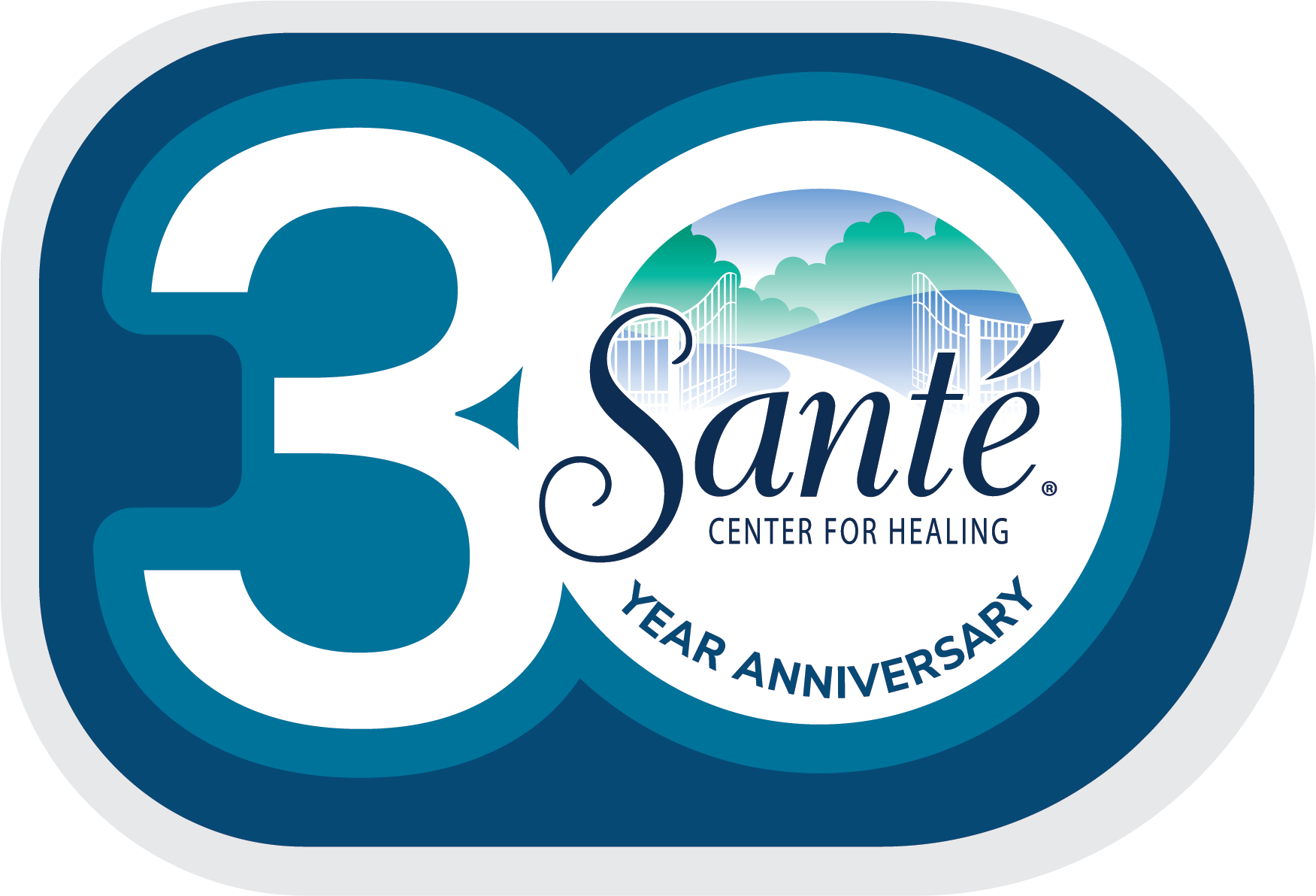When you’re trying to figure out whether you need effective rehab or mental health support—or both—it can feel overwhelming. What if it’s not one or the other, but both at the same time? That’s where dual diagnosis treatment comes in. At Santé Center for Healing, we help hurting individuals and families in crisis by addressing addiction and co-occurring mental health conditions together in one integrated clinical and medical continuum of care.
You don’t have to wait until things spiral further out of control. Help is available now. Call Santé Center for Healing today to talk to someone who understands and can walk you through your next step toward recovery.
What is dual diagnosis?
Dual diagnosis means you’re experiencing both a substance use issue and a mental health condition at the same time. It’s also known as having co-occurring disorders. Some examples include:
- Living with alcohol use disorder (AUD) and depression
- Using prescription pills to manage symptoms of anxiety
- Managing bipolar disorder while also struggling with stimulant misuse
- Experiencing an eating disorder that’s complicated by alcohol or drug use
This overlap is extremely common. According to the Substance Abuse and Mental Health Services Administration (SAMHSA), more than 21 million adults in the United States had both a mental health condition and a substance use disorder in 2022.¹ That number continues to grow, especially as people face rising stress, economic hardship, and isolation.² People often turn to substances to ease the pain of untreated mental health issues, not realizing they’re creating a cycle that worsens both. For example, someone may begin drinking more heavily to cope with social anxiety, which over time increases their depression and creates more distance in relationships. Or a person managing bipolar disorder may find that stimulants amplify their manic episodes and interfere with sleep, leading to more instability and distress.
In dual diagnosis treatment, the goal is to address everything at once, not in silos. Treating one condition while ignoring the other is like treating only half the wound. Lasting recovery starts with a whole-person approach.
Why is dual diagnosis treatment important?
Mental health and substance use are deeply connected. One can easily mask or intensify the other. You might wonder: “Am I drinking because I’m depressed, or am I depressed because I drink?” The answer may be both.
Many traditional treatment programs focus on one issue at a time. But that leaves a major gap in care. If you go to treatment for addiction and your anxiety is never addressed, you might leave without the tools to manage your stress without substances. Likewise, if you get therapy for depression but continue to misuse alcohol, your symptoms may never fully improve.
That’s why dual diagnosis treatment is vital. It helps reduce barriers and interruptions to medical and clinical care by supporting both sides of the equation in one cohesive program.
Some common co-occurring conditions treated through dual diagnosis include:
- Anxiety: Generalized anxiety disorder (GAD), panic disorder, and social anxiety frequently show up alongside substance use.
- Bipolar disorder: This condition can make mood regulation difficult, and substances may be used in attempts to “balance out” the highs and lows.
- Depression: It can fuel substance use, and substances can intensify feelings of hopelessness.
- Disordered eating: Often linked to trauma or control, it may co-occur with substance misuse, especially stimulants or alcohol.
- Post-traumatic stress disorder (PTSD): Many people with PTSD turn to substances to numb or avoid overwhelming memories.
By addressing both conditions together, dual diagnosis treatment helps you build a foundation for lasting recovery—not just short-term symptom relief.
What are the benefits of dual diagnosis?
People facing both mental health challenges and substance use concerns often feel stuck in a cycle of struggle. You might feel like you’ve tried everything, but nothing seems to “stick.” That’s where dual diagnosis can help shift the course.
Here are just a few of the benefits:
- True, whole-person healing: You are more than your diagnosis. Dual diagnosis treatment considers your emotional, psychological, physical, and relational well-being.
- Fewer relapses: When underlying emotional pain is addressed through therapy and medication support, you’re less likely to return to substance use for relief.
- Improved mental clarity: Getting off substances allows for more accurate mental health assessments and better progress in therapy.
- Customized care plans: Every person has a unique story. Your needs, experiences, and goals can shape your treatment.
- Better relationships: Healing both mental and substance-related issues can help rebuild trust and connection with others.
- Increased motivation: As symptoms improve and self-worth builds, many clients find a renewed sense of purpose and energy for life.
In short, dual diagnosis treatment creates a more stable and compassionate environment for growth. It doesn’t force you to choose between healing your mind or body—it invites you to care for both.
When should you consider dual diagnosis treatment?
You might wonder if what you’re going through qualifies for dual diagnosis. The truth is, you don’t have to have everything “figured out” before reaching out. Many people come to treatment unsure about their diagnosis, and that’s okay.
Consider dual diagnosis treatment if:
- You’ve used alcohol or drugs to deal with emotional pain or mental health symptoms
- Your symptoms of depression, anxiety, or mood instability get worse when you try to stop using substances
- You’ve been diagnosed with a mental health condition and feel like substance use is making it harder to manage
- You’ve tried traditional rehab or therapy before, but it didn’t address the full scope of what you were dealing with
- You’ve experienced a mental health crisis or hospitalization connected to substance use
You may notice physical or behavioral changes, such as increased isolation or irritability, difficulty sleeping or eating, trouble managing work, school, or relationships, persistent feelings of shame or hopelessness, or experiencing panic attacks and emotional outbursts.
Even if you’ve never had a formal diagnosis, it’s okay to ask questions like, “Is there dual diagnosis treatment near me?” or “Could my drinking be related to my anxiety?” These are the types of questions that dual diagnosis programs help you explore without judgment.
At Santé Center for Healing, we offer professional assessments that help bring clarity to what you’re facing so you can begin the right path toward healing and recovery.
Why should you choose Santé Center for Healing for your mental health and addiction needs?
When searching for help, you want to know you’re not just another number or case file. At Santé Center for Healing, we recognize that addiction is a chronic and potentially fatal disease—and we approach each person’s care with compassion, precision, and deep respect for their full humanity.
Here’s what makes our program a powerful choice for dual diagnosis treatment:
- A full continuum of care: We offer medical detox, residential treatment, intensive outpatient programming, transitional living, and long-term support—all in one place.
- Expertise in co-occurring disorders: Our team includes licensed therapists, psychiatrists, and addiction specialists who are skilled in treating conditions like depression, anxiety, bipolar disorder, PTSD, and disordered eating alongside substance use.
- Evidence-based therapies: Clients benefit from cognitive-behavioral therapy (CBT), dialectical behavior therapy (DBT), individual counseling, group work, eye movement desensitization and reprocessing (EMDR), and medication management.
- Specialized programs: We offer trauma treatment, support for professionals, men’s and women’s recovery programs, and a robust alumni network.
- Healing setting: Our 16-acre campus in Argyle, Texas, offers a peaceful place for reflection and growth. Many people have rediscovered who they are outside of diagnosis and beyond addiction.
- Trauma-informed care: Many people living with mental health and addiction concerns have trauma in their past. We meet you with sensitivity, not blame.
You don’t have to walk this road alone. Healing is hard work, but it’s absolutely possible with the right team beside you.
Get on the pathway toward recovery with Santé Center for Healing in Argyle, TX
If you’ve been living with untreated mental health symptoms or returning to substance use despite your best efforts, it might be time for a new approach. At Santé Center for Healing, we fearlessly offer a pathway toward recovery that supports your whole self—body, mind, and heart.
Contact our team online or call 866.238.3154 today to speak with someone who can help you take that brave first step.
Footnotes:


